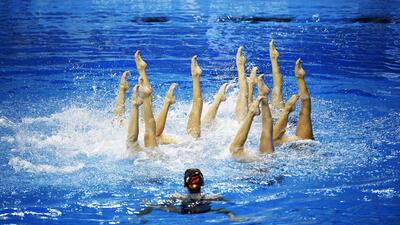An array of Olympians and stars of sports niche and new are in the South Korean city of Incheon for the 17th Asian Games, which begin on Friday.
The Games bring together about 10,000 athletes for a 16-day multi-sport spectacular second only in scale to the Summer Olympics.
From weightlifting to wushu, rowing to rugby sevens and swimming to sepak takraw, the Games will showcase elite Asian talent in 28 Olympic and eight non-Olympic sports from tomorrow until October 4, with a total of 439 gold medals up for grabs.
While China are certainties to top the medal count for the ninth straight Games, South Korea have set an ambitious target of 90 golds, though the hosts would probably settle for less as long as they finish above fierce rivals Japan.
India, perennial underachievers in world sport, are determined to improve on the 14 golds they won four years ago in Guangzhou, while Malaysia, Singapore and Thailand will battle it out for bragging rights in South East Asia.
Four years on from Guangzhou’s glitzy Games, which by some estimates left the city in debt to the tune of US$32 billion (Dh117.5b), South Korea has spent a reported 1.2 trillion won (US$1.2bn) on construction costs to host the event for a third time. Operational costs are expected to run to 480 billion won.
The huge costs of hosting the multi-sports event may make countries think twice about bidding for future Games.
Vietnam quit as 2019 hosts amid concerns it would not prove financially viable. India and Malaysia both decided against throwing their hats into the ring to host the event, citing financial concerns.
Indonesia looks to be the only candidate willing to step in, and the Olympic Council of Asia (OCA) will announce its decision on the host at its general assembly in Incheon later this month.
While organisers will hope to keep the focus firmly on sport, China’s strained relations with some of its Asian neighbours over territorial disputes in the East and South China Seas could add spice to the competition.
Beijing has been involved in disputes with Vietnam, the Philippines and other South East Asian countries over claims in the South China Sea, and tensions have also been heightened with Japan and South Korea over Beijing’s declaration of an air defence identification zone.
While “sports diplomacy” can sometimes help smooth bumpy relations between countries, Lee Tai-hwan, director of Seoul’s Sejong Institute, said it would be difficult to expect any concrete improvements arising from the Asian Games.
“While sports events like this can act as a catalyst, the Asian Games won’t be a watershed moment to resolve conflicts and improve the ties in the region,” he said.
“Although we cannot completely rule out the positive effects the Games would have on the geopolitical situation in Asia, they won’t be big or long-lasting.”
For most of the continent’s athletes, the lure of an Asian Games gold medal rests in the fame and fortune it often brings, but for South Korean men there is a bigger prize at stake – an exemption from two years of military service.
South Korea is technically still at war with its northern neighbour after the 1950-53 Korean War ended in a truce and not a peace treaty. It requires all able-bodied men to serve two years in the military.
In a bid to foster elite athletes, South Korea offers exemptions to those winning gold at the Asian Games or a medal of any colour at the Olympics.
Hosting the Games for a third time after Seoul in 1986 and Busan in 2002, South Korea have gold medal favourites in Park Tae-hwan (swimming), Son Yeon-jae (rhythmic gymnastics) and Oh Jin-hyek (recurve archery).
They also have high hopes in shooting, fencing, judo and taekwondo, as well as team events such as baseball and men’s and women’s football.
North Korea will also send athletes to the Games, but negotiations on their participation have been tricky.
Late last month, the North announced they had decided not to send a squad of 350 cheerleaders to Incheon and accused Seoul of “abusing sacred sports and cultural exchange” for a “sinister political purpose”.
While talks continue between the two Koreas over the details of the North’s delegation, Pyongyang is expected to send about 150 athletes to Incheon.
The North, which rewards its top athletes with apartments, cars and cash for raising the country’s image on the world stage, could win several gold medals in weightlifting after earning three at the London Olympics two years ago.
Tokyo has won the right to host the 2020 Summer Olympics, but Japan won only seven gold medals at the London Games two years ago and have finished third in the medal standings behind China and South Korea at the last four Asian Games.
The Japanese are sending 716 athletes to South Korea, with their swim team expected to spearhead the gold medal hunt following their seven wins at the Pan Pacific Championships in Australia last month.
Weightlifter Hiromi Miyake will act as captain and archer Kaori Kawanaka the flag bearer, the first time Japan have picked two women to undertake the duties at an Olympic or Asian Games.
While the powerhouses of North East Asia slug it out for the gold medals, the smaller nations will also be vying to get on the podium, with only Bhutan, Maldives and East Timor yet to win an Asian Games medal.
Perhaps they will find success in some of the less mainstream sports at the Games, such as 10-pin bowling or sepak takraw, where players use their feet, knees, chest and head to send a rattan ball over a net into the opposition court.
Among the sports left off the Incheon programme from the Guangzhou Games were dragon boat racing and board games, on which the Chinese had a virtual monopoly
sports@thenational.ae
Follow us on Twitter at @SprtNationalUAE

